Legal Aspects of Business: Apparent Authority and Case Law Analysis
VerifiedAdded on 2020/10/04
|9
|3055
|43
Report
AI Summary
This report examines the legal aspects of business, focusing on apparent authority and statutory interpretation. It critically discusses the main features of apparent authority, differentiating between actual and apparent authority through case analysis like Freeman & Lockyer v Buckhurst Park Properties. The report then delves into statutory interpretation, exploring the literal and mischief rules, along with the Golden rule, providing case examples such as Fisher v Bell and Whitely v Chappel. The report highlights the application of these rules in legal contexts, providing a comprehensive overview of their significance in business law and legal decision-making.
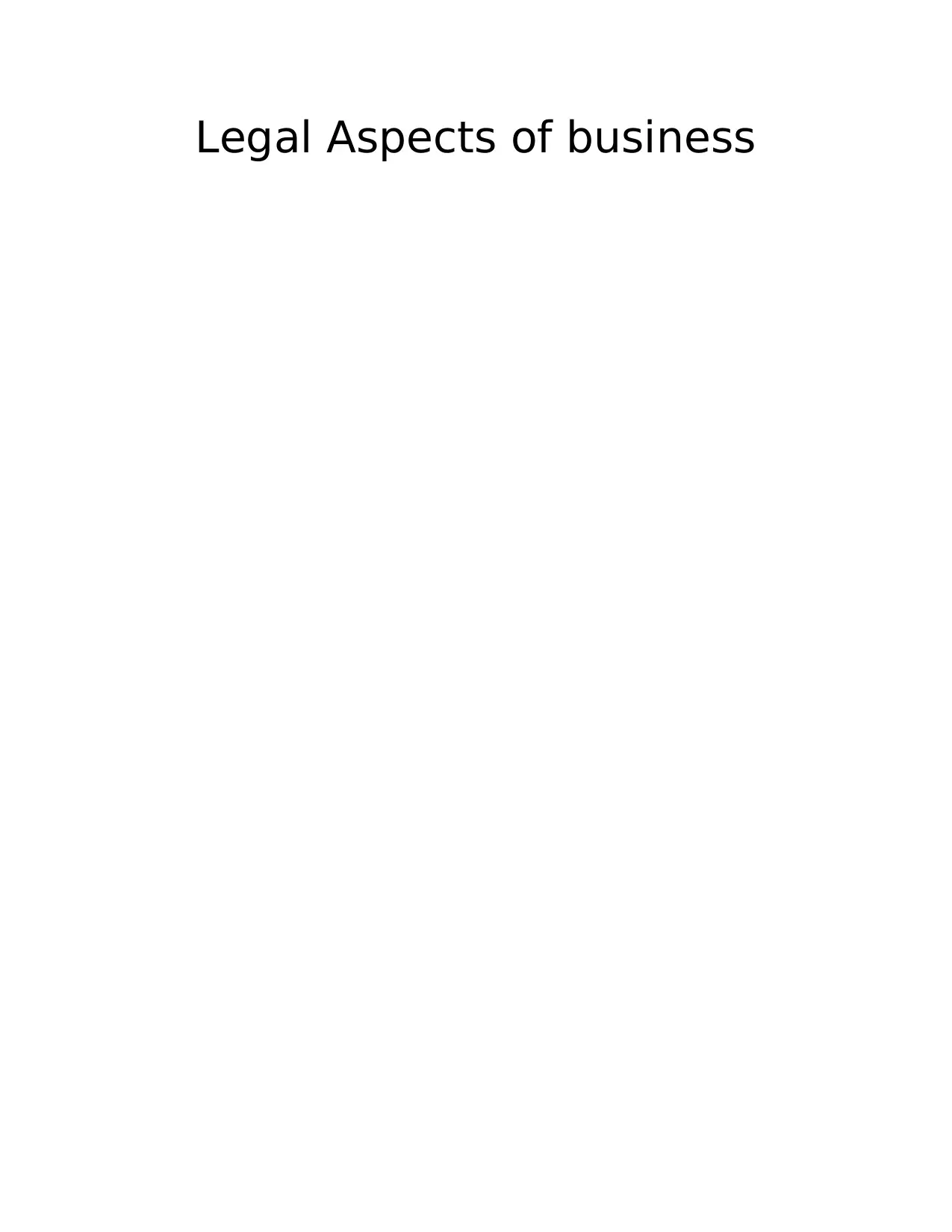
Legal Aspects of business
Paraphrase This Document
Need a fresh take? Get an instant paraphrase of this document with our AI Paraphraser
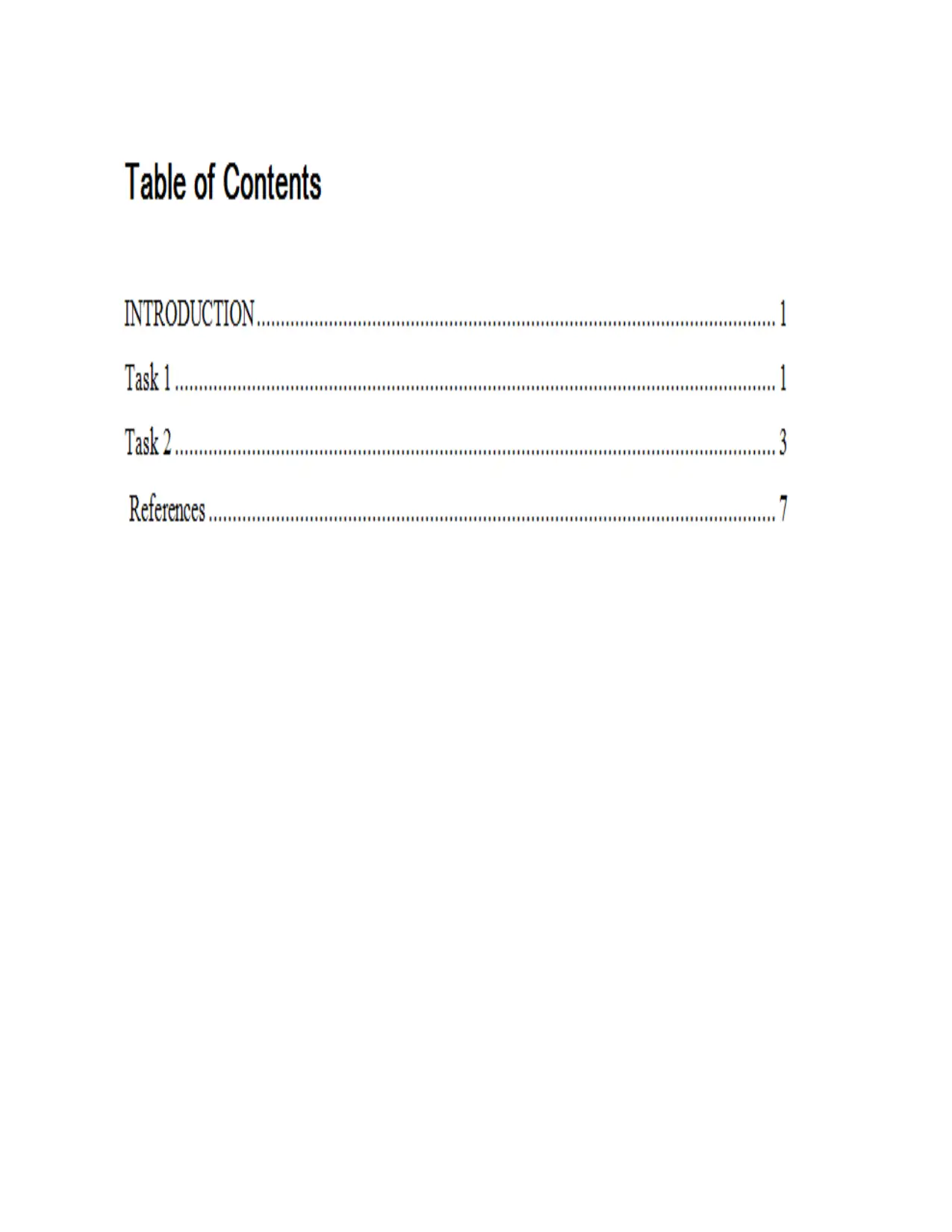
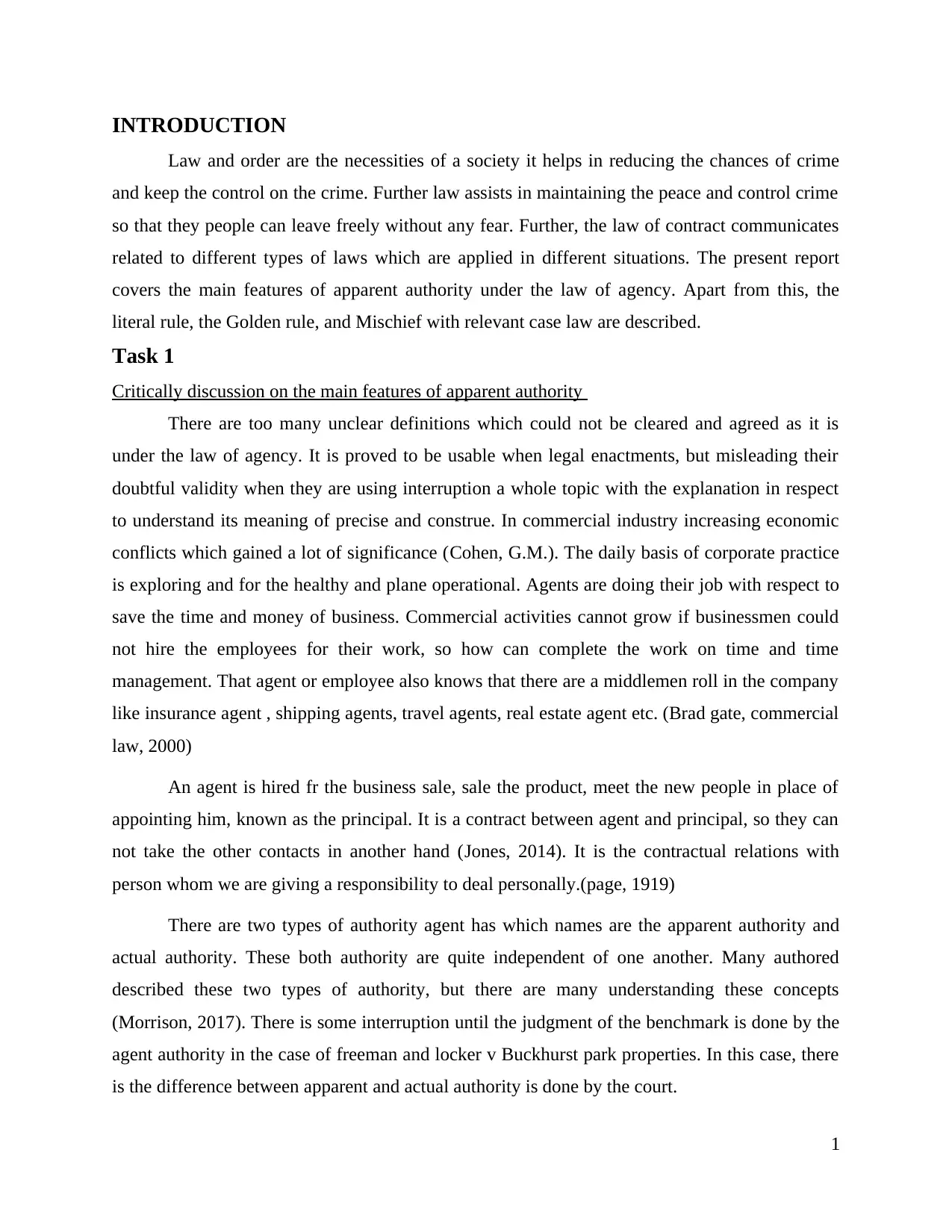
INTRODUCTION
Law and order are the necessities of a society it helps in reducing the chances of crime
and keep the control on the crime. Further law assists in maintaining the peace and control crime
so that they people can leave freely without any fear. Further, the law of contract communicates
related to different types of laws which are applied in different situations. The present report
covers the main features of apparent authority under the law of agency. Apart from this, the
literal rule, the Golden rule, and Mischief with relevant case law are described.
Task 1
Critically discussion on the main features of apparent authority
There are too many unclear definitions which could not be cleared and agreed as it is
under the law of agency. It is proved to be usable when legal enactments, but misleading their
doubtful validity when they are using interruption a whole topic with the explanation in respect
to understand its meaning of precise and construe. In commercial industry increasing economic
conflicts which gained a lot of significance (Cohen, G.M.). The daily basis of corporate practice
is exploring and for the healthy and plane operational. Agents are doing their job with respect to
save the time and money of business. Commercial activities cannot grow if businessmen could
not hire the employees for their work, so how can complete the work on time and time
management. That agent or employee also knows that there are a middlemen roll in the company
like insurance agent , shipping agents, travel agents, real estate agent etc. (Brad gate, commercial
law, 2000)
An agent is hired fr the business sale, sale the product, meet the new people in place of
appointing him, known as the principal. It is a contract between agent and principal, so they can
not take the other contacts in another hand (Jones, 2014). It is the contractual relations with
person whom we are giving a responsibility to deal personally.(page, 1919)
There are two types of authority agent has which names are the apparent authority and
actual authority. These both authority are quite independent of one another. Many authored
described these two types of authority, but there are many understanding these concepts
(Morrison, 2017). There is some interruption until the judgment of the benchmark is done by the
agent authority in the case of freeman and locker v Buckhurst park properties. In this case, there
is the difference between apparent and actual authority is done by the court.
1
Law and order are the necessities of a society it helps in reducing the chances of crime
and keep the control on the crime. Further law assists in maintaining the peace and control crime
so that they people can leave freely without any fear. Further, the law of contract communicates
related to different types of laws which are applied in different situations. The present report
covers the main features of apparent authority under the law of agency. Apart from this, the
literal rule, the Golden rule, and Mischief with relevant case law are described.
Task 1
Critically discussion on the main features of apparent authority
There are too many unclear definitions which could not be cleared and agreed as it is
under the law of agency. It is proved to be usable when legal enactments, but misleading their
doubtful validity when they are using interruption a whole topic with the explanation in respect
to understand its meaning of precise and construe. In commercial industry increasing economic
conflicts which gained a lot of significance (Cohen, G.M.). The daily basis of corporate practice
is exploring and for the healthy and plane operational. Agents are doing their job with respect to
save the time and money of business. Commercial activities cannot grow if businessmen could
not hire the employees for their work, so how can complete the work on time and time
management. That agent or employee also knows that there are a middlemen roll in the company
like insurance agent , shipping agents, travel agents, real estate agent etc. (Brad gate, commercial
law, 2000)
An agent is hired fr the business sale, sale the product, meet the new people in place of
appointing him, known as the principal. It is a contract between agent and principal, so they can
not take the other contacts in another hand (Jones, 2014). It is the contractual relations with
person whom we are giving a responsibility to deal personally.(page, 1919)
There are two types of authority agent has which names are the apparent authority and
actual authority. These both authority are quite independent of one another. Many authored
described these two types of authority, but there are many understanding these concepts
(Morrison, 2017). There is some interruption until the judgment of the benchmark is done by the
agent authority in the case of freeman and locker v Buckhurst park properties. In this case, there
is the difference between apparent and actual authority is done by the court.
1
⊘ This is a preview!⊘
Do you want full access?
Subscribe today to unlock all pages.

Trusted by 1+ million students worldwide
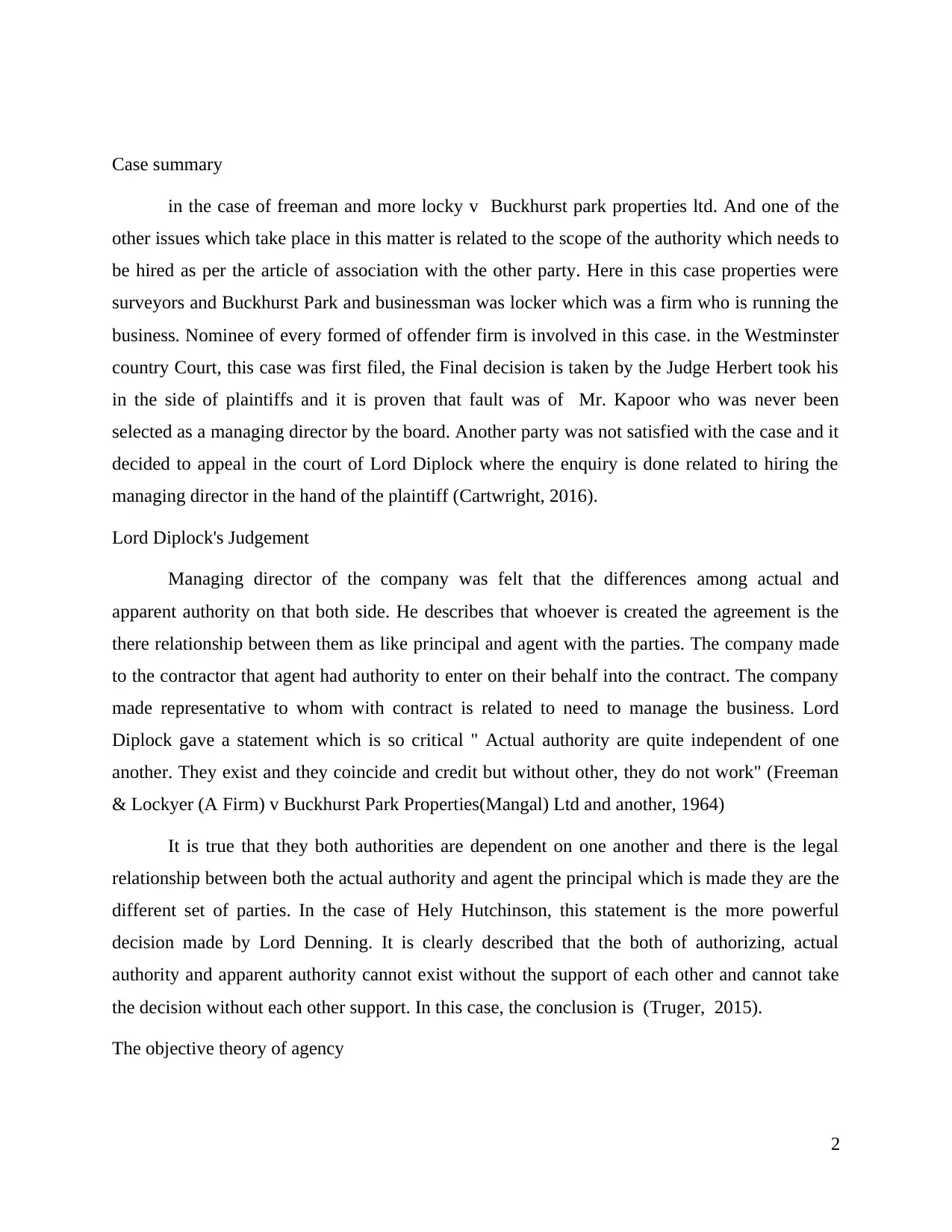
Case summary
in the case of freeman and more locky v Buckhurst park properties ltd. And one of the
other issues which take place in this matter is related to the scope of the authority which needs to
be hired as per the article of association with the other party. Here in this case properties were
surveyors and Buckhurst Park and businessman was locker which was a firm who is running the
business. Nominee of every formed of offender firm is involved in this case. in the Westminster
country Court, this case was first filed, the Final decision is taken by the Judge Herbert took his
in the side of plaintiffs and it is proven that fault was of Mr. Kapoor who was never been
selected as a managing director by the board. Another party was not satisfied with the case and it
decided to appeal in the court of Lord Diplock where the enquiry is done related to hiring the
managing director in the hand of the plaintiff (Cartwright, 2016).
Lord Diplock's Judgement
Managing director of the company was felt that the differences among actual and
apparent authority on that both side. He describes that whoever is created the agreement is the
there relationship between them as like principal and agent with the parties. The company made
to the contractor that agent had authority to enter on their behalf into the contract. The company
made representative to whom with contract is related to need to manage the business. Lord
Diplock gave a statement which is so critical " Actual authority are quite independent of one
another. They exist and they coincide and credit but without other, they do not work" (Freeman
& Lockyer (A Firm) v Buckhurst Park Properties(Mangal) Ltd and another, 1964)
It is true that they both authorities are dependent on one another and there is the legal
relationship between both the actual authority and agent the principal which is made they are the
different set of parties. In the case of Hely Hutchinson, this statement is the more powerful
decision made by Lord Denning. It is clearly described that the both of authorizing, actual
authority and apparent authority cannot exist without the support of each other and cannot take
the decision without each other support. In this case, the conclusion is (Truger, 2015).
The objective theory of agency
2
in the case of freeman and more locky v Buckhurst park properties ltd. And one of the
other issues which take place in this matter is related to the scope of the authority which needs to
be hired as per the article of association with the other party. Here in this case properties were
surveyors and Buckhurst Park and businessman was locker which was a firm who is running the
business. Nominee of every formed of offender firm is involved in this case. in the Westminster
country Court, this case was first filed, the Final decision is taken by the Judge Herbert took his
in the side of plaintiffs and it is proven that fault was of Mr. Kapoor who was never been
selected as a managing director by the board. Another party was not satisfied with the case and it
decided to appeal in the court of Lord Diplock where the enquiry is done related to hiring the
managing director in the hand of the plaintiff (Cartwright, 2016).
Lord Diplock's Judgement
Managing director of the company was felt that the differences among actual and
apparent authority on that both side. He describes that whoever is created the agreement is the
there relationship between them as like principal and agent with the parties. The company made
to the contractor that agent had authority to enter on their behalf into the contract. The company
made representative to whom with contract is related to need to manage the business. Lord
Diplock gave a statement which is so critical " Actual authority are quite independent of one
another. They exist and they coincide and credit but without other, they do not work" (Freeman
& Lockyer (A Firm) v Buckhurst Park Properties(Mangal) Ltd and another, 1964)
It is true that they both authorities are dependent on one another and there is the legal
relationship between both the actual authority and agent the principal which is made they are the
different set of parties. In the case of Hely Hutchinson, this statement is the more powerful
decision made by Lord Denning. It is clearly described that the both of authorizing, actual
authority and apparent authority cannot exist without the support of each other and cannot take
the decision without each other support. In this case, the conclusion is (Truger, 2015).
The objective theory of agency
2
Paraphrase This Document
Need a fresh take? Get an instant paraphrase of this document with our AI Paraphraser
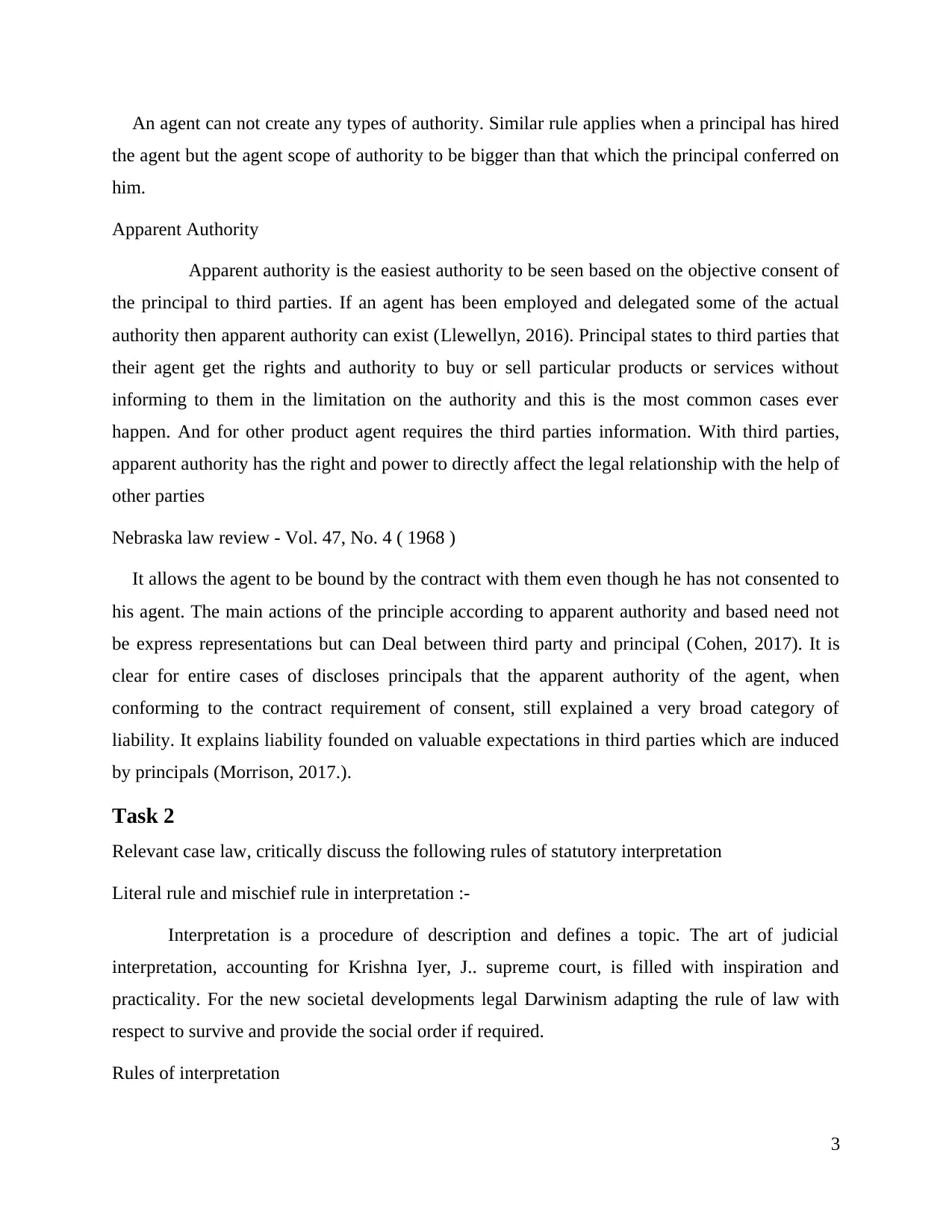
An agent can not create any types of authority. Similar rule applies when a principal has hired
the agent but the agent scope of authority to be bigger than that which the principal conferred on
him.
Apparent Authority
Apparent authority is the easiest authority to be seen based on the objective consent of
the principal to third parties. If an agent has been employed and delegated some of the actual
authority then apparent authority can exist (Llewellyn, 2016). Principal states to third parties that
their agent get the rights and authority to buy or sell particular products or services without
informing to them in the limitation on the authority and this is the most common cases ever
happen. And for other product agent requires the third parties information. With third parties,
apparent authority has the right and power to directly affect the legal relationship with the help of
other parties
Nebraska law review - Vol. 47, No. 4 ( 1968 )
It allows the agent to be bound by the contract with them even though he has not consented to
his agent. The main actions of the principle according to apparent authority and based need not
be express representations but can Deal between third party and principal (Cohen, 2017). It is
clear for entire cases of discloses principals that the apparent authority of the agent, when
conforming to the contract requirement of consent, still explained a very broad category of
liability. It explains liability founded on valuable expectations in third parties which are induced
by principals (Morrison, 2017.).
Task 2
Relevant case law, critically discuss the following rules of statutory interpretation
Literal rule and mischief rule in interpretation :-
Interpretation is a procedure of description and defines a topic. The art of judicial
interpretation, accounting for Krishna Iyer, J.. supreme court, is filled with inspiration and
practicality. For the new societal developments legal Darwinism adapting the rule of law with
respect to survive and provide the social order if required.
Rules of interpretation
3
the agent but the agent scope of authority to be bigger than that which the principal conferred on
him.
Apparent Authority
Apparent authority is the easiest authority to be seen based on the objective consent of
the principal to third parties. If an agent has been employed and delegated some of the actual
authority then apparent authority can exist (Llewellyn, 2016). Principal states to third parties that
their agent get the rights and authority to buy or sell particular products or services without
informing to them in the limitation on the authority and this is the most common cases ever
happen. And for other product agent requires the third parties information. With third parties,
apparent authority has the right and power to directly affect the legal relationship with the help of
other parties
Nebraska law review - Vol. 47, No. 4 ( 1968 )
It allows the agent to be bound by the contract with them even though he has not consented to
his agent. The main actions of the principle according to apparent authority and based need not
be express representations but can Deal between third party and principal (Cohen, 2017). It is
clear for entire cases of discloses principals that the apparent authority of the agent, when
conforming to the contract requirement of consent, still explained a very broad category of
liability. It explains liability founded on valuable expectations in third parties which are induced
by principals (Morrison, 2017.).
Task 2
Relevant case law, critically discuss the following rules of statutory interpretation
Literal rule and mischief rule in interpretation :-
Interpretation is a procedure of description and defines a topic. The art of judicial
interpretation, accounting for Krishna Iyer, J.. supreme court, is filled with inspiration and
practicality. For the new societal developments legal Darwinism adapting the rule of law with
respect to survive and provide the social order if required.
Rules of interpretation
3
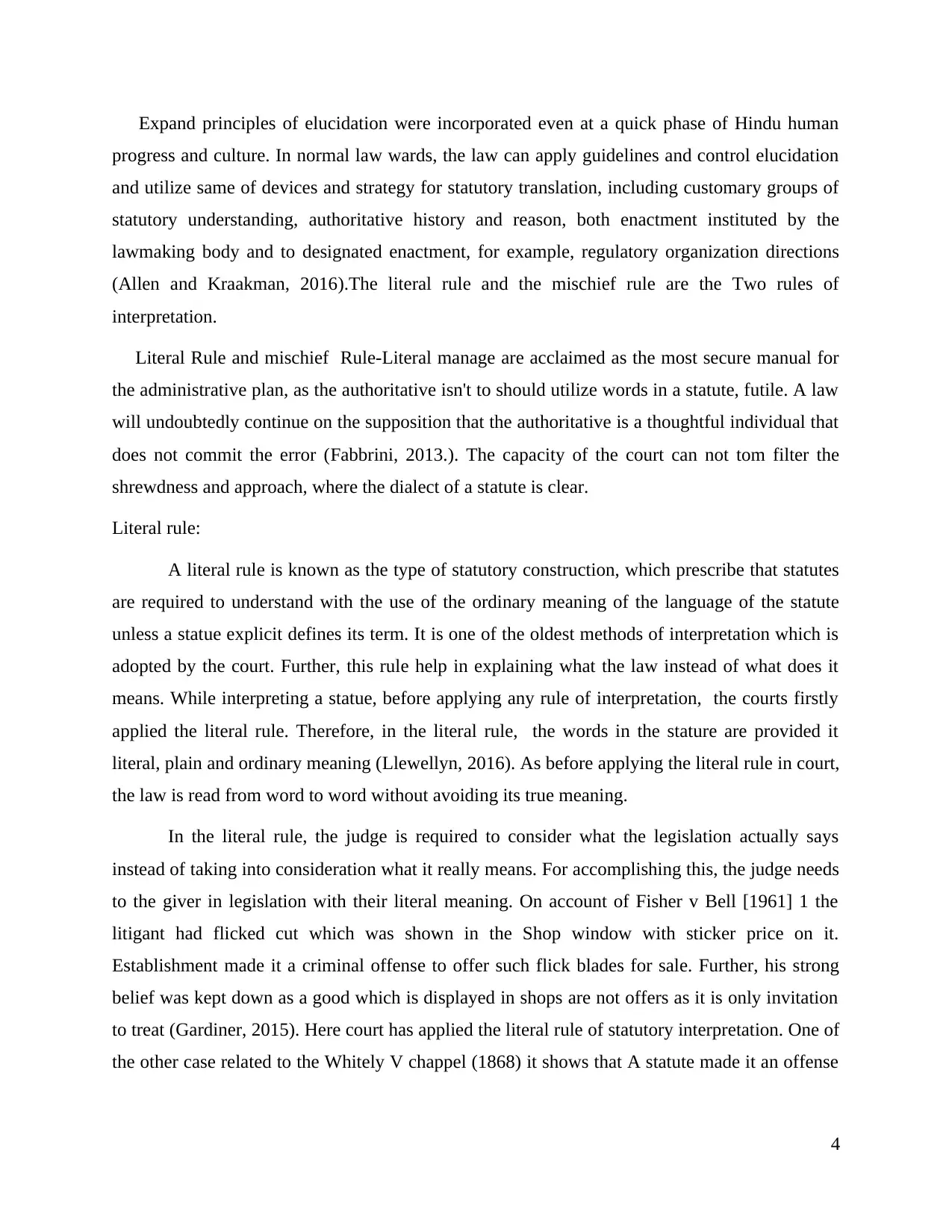
Expand principles of elucidation were incorporated even at a quick phase of Hindu human
progress and culture. In normal law wards, the law can apply guidelines and control elucidation
and utilize same of devices and strategy for statutory translation, including customary groups of
statutory understanding, authoritative history and reason, both enactment instituted by the
lawmaking body and to designated enactment, for example, regulatory organization directions
(Allen and Kraakman, 2016).The literal rule and the mischief rule are the Two rules of
interpretation.
Literal Rule and mischief Rule-Literal manage are acclaimed as the most secure manual for
the administrative plan, as the authoritative isn't to should utilize words in a statute, futile. A law
will undoubtedly continue on the supposition that the authoritative is a thoughtful individual that
does not commit the error (Fabbrini, 2013.). The capacity of the court can not tom filter the
shrewdness and approach, where the dialect of a statute is clear.
Literal rule:
A literal rule is known as the type of statutory construction, which prescribe that statutes
are required to understand with the use of the ordinary meaning of the language of the statute
unless a statue explicit defines its term. It is one of the oldest methods of interpretation which is
adopted by the court. Further, this rule help in explaining what the law instead of what does it
means. While interpreting a statue, before applying any rule of interpretation, the courts firstly
applied the literal rule. Therefore, in the literal rule, the words in the stature are provided it
literal, plain and ordinary meaning (Llewellyn, 2016). As before applying the literal rule in court,
the law is read from word to word without avoiding its true meaning.
In the literal rule, the judge is required to consider what the legislation actually says
instead of taking into consideration what it really means. For accomplishing this, the judge needs
to the giver in legislation with their literal meaning. On account of Fisher v Bell [1961] 1 the
litigant had flicked cut which was shown in the Shop window with sticker price on it.
Establishment made it a criminal offense to offer such flick blades for sale. Further, his strong
belief was kept down as a good which is displayed in shops are not offers as it is only invitation
to treat (Gardiner, 2015). Here court has applied the literal rule of statutory interpretation. One of
the other case related to the Whitely V chappel (1868) it shows that A statute made it an offense
4
progress and culture. In normal law wards, the law can apply guidelines and control elucidation
and utilize same of devices and strategy for statutory translation, including customary groups of
statutory understanding, authoritative history and reason, both enactment instituted by the
lawmaking body and to designated enactment, for example, regulatory organization directions
(Allen and Kraakman, 2016).The literal rule and the mischief rule are the Two rules of
interpretation.
Literal Rule and mischief Rule-Literal manage are acclaimed as the most secure manual for
the administrative plan, as the authoritative isn't to should utilize words in a statute, futile. A law
will undoubtedly continue on the supposition that the authoritative is a thoughtful individual that
does not commit the error (Fabbrini, 2013.). The capacity of the court can not tom filter the
shrewdness and approach, where the dialect of a statute is clear.
Literal rule:
A literal rule is known as the type of statutory construction, which prescribe that statutes
are required to understand with the use of the ordinary meaning of the language of the statute
unless a statue explicit defines its term. It is one of the oldest methods of interpretation which is
adopted by the court. Further, this rule help in explaining what the law instead of what does it
means. While interpreting a statue, before applying any rule of interpretation, the courts firstly
applied the literal rule. Therefore, in the literal rule, the words in the stature are provided it
literal, plain and ordinary meaning (Llewellyn, 2016). As before applying the literal rule in court,
the law is read from word to word without avoiding its true meaning.
In the literal rule, the judge is required to consider what the legislation actually says
instead of taking into consideration what it really means. For accomplishing this, the judge needs
to the giver in legislation with their literal meaning. On account of Fisher v Bell [1961] 1 the
litigant had flicked cut which was shown in the Shop window with sticker price on it.
Establishment made it a criminal offense to offer such flick blades for sale. Further, his strong
belief was kept down as a good which is displayed in shops are not offers as it is only invitation
to treat (Gardiner, 2015). Here court has applied the literal rule of statutory interpretation. One of
the other case related to the Whitely V chappel (1868) it shows that A statute made it an offense
4
⊘ This is a preview!⊘
Do you want full access?
Subscribe today to unlock all pages.

Trusted by 1+ million students worldwide
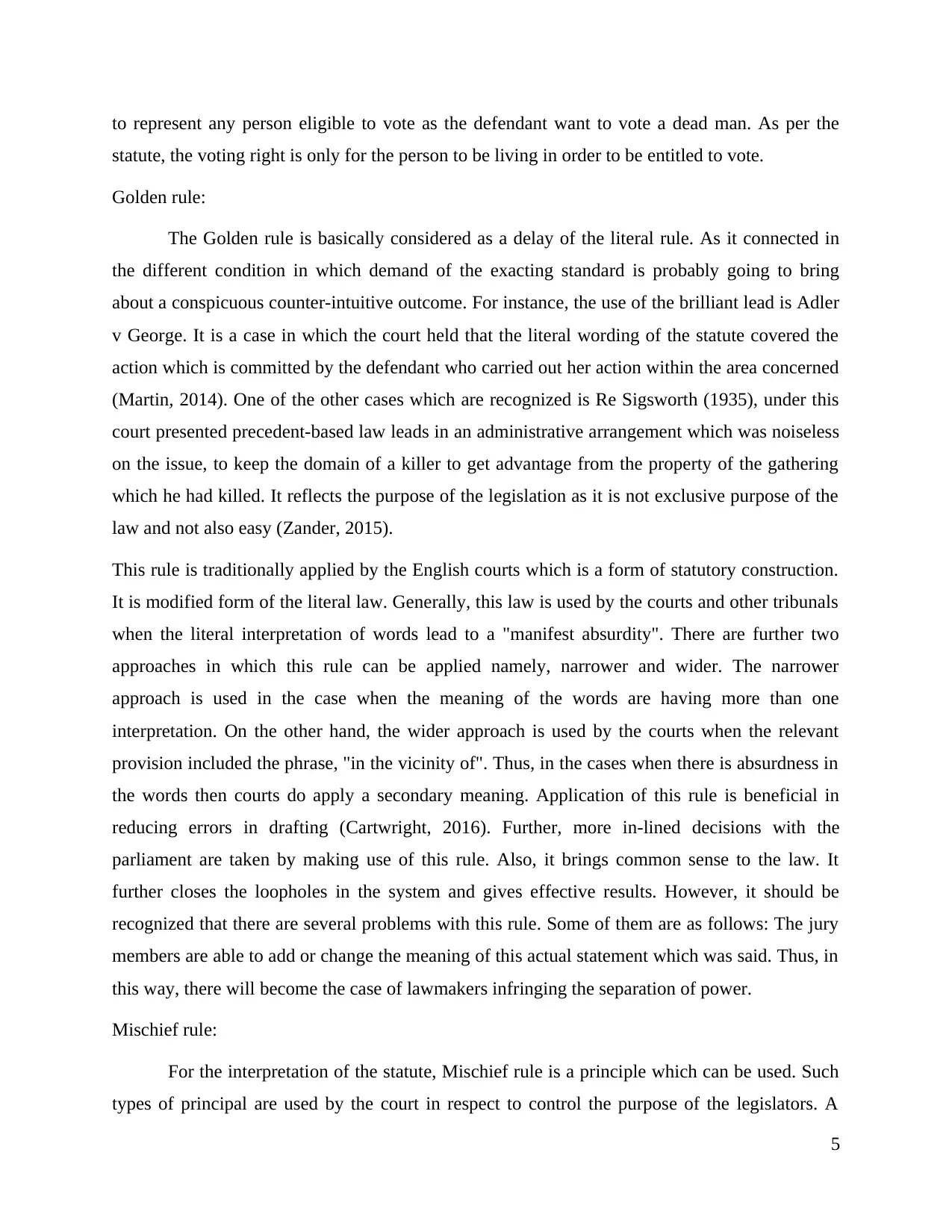
to represent any person eligible to vote as the defendant want to vote a dead man. As per the
statute, the voting right is only for the person to be living in order to be entitled to vote.
Golden rule:
The Golden rule is basically considered as a delay of the literal rule. As it connected in
the different condition in which demand of the exacting standard is probably going to bring
about a conspicuous counter-intuitive outcome. For instance, the use of the brilliant lead is Adler
v George. It is a case in which the court held that the literal wording of the statute covered the
action which is committed by the defendant who carried out her action within the area concerned
(Martin, 2014). One of the other cases which are recognized is Re Sigsworth (1935), under this
court presented precedent-based law leads in an administrative arrangement which was noiseless
on the issue, to keep the domain of a killer to get advantage from the property of the gathering
which he had killed. It reflects the purpose of the legislation as it is not exclusive purpose of the
law and not also easy (Zander, 2015).
This rule is traditionally applied by the English courts which is a form of statutory construction.
It is modified form of the literal law. Generally, this law is used by the courts and other tribunals
when the literal interpretation of words lead to a "manifest absurdity". There are further two
approaches in which this rule can be applied namely, narrower and wider. The narrower
approach is used in the case when the meaning of the words are having more than one
interpretation. On the other hand, the wider approach is used by the courts when the relevant
provision included the phrase, "in the vicinity of". Thus, in the cases when there is absurdness in
the words then courts do apply a secondary meaning. Application of this rule is beneficial in
reducing errors in drafting (Cartwright, 2016). Further, more in-lined decisions with the
parliament are taken by making use of this rule. Also, it brings common sense to the law. It
further closes the loopholes in the system and gives effective results. However, it should be
recognized that there are several problems with this rule. Some of them are as follows: The jury
members are able to add or change the meaning of this actual statement which was said. Thus, in
this way, there will become the case of lawmakers infringing the separation of power.
Mischief rule:
For the interpretation of the statute, Mischief rule is a principle which can be used. Such
types of principal are used by the court in respect to control the purpose of the legislators. A
5
statute, the voting right is only for the person to be living in order to be entitled to vote.
Golden rule:
The Golden rule is basically considered as a delay of the literal rule. As it connected in
the different condition in which demand of the exacting standard is probably going to bring
about a conspicuous counter-intuitive outcome. For instance, the use of the brilliant lead is Adler
v George. It is a case in which the court held that the literal wording of the statute covered the
action which is committed by the defendant who carried out her action within the area concerned
(Martin, 2014). One of the other cases which are recognized is Re Sigsworth (1935), under this
court presented precedent-based law leads in an administrative arrangement which was noiseless
on the issue, to keep the domain of a killer to get advantage from the property of the gathering
which he had killed. It reflects the purpose of the legislation as it is not exclusive purpose of the
law and not also easy (Zander, 2015).
This rule is traditionally applied by the English courts which is a form of statutory construction.
It is modified form of the literal law. Generally, this law is used by the courts and other tribunals
when the literal interpretation of words lead to a "manifest absurdity". There are further two
approaches in which this rule can be applied namely, narrower and wider. The narrower
approach is used in the case when the meaning of the words are having more than one
interpretation. On the other hand, the wider approach is used by the courts when the relevant
provision included the phrase, "in the vicinity of". Thus, in the cases when there is absurdness in
the words then courts do apply a secondary meaning. Application of this rule is beneficial in
reducing errors in drafting (Cartwright, 2016). Further, more in-lined decisions with the
parliament are taken by making use of this rule. Also, it brings common sense to the law. It
further closes the loopholes in the system and gives effective results. However, it should be
recognized that there are several problems with this rule. Some of them are as follows: The jury
members are able to add or change the meaning of this actual statement which was said. Thus, in
this way, there will become the case of lawmakers infringing the separation of power.
Mischief rule:
For the interpretation of the statute, Mischief rule is a principle which can be used. Such
types of principal are used by the court in respect to control the purpose of the legislators. A
5
Paraphrase This Document
Need a fresh take? Get an instant paraphrase of this document with our AI Paraphraser
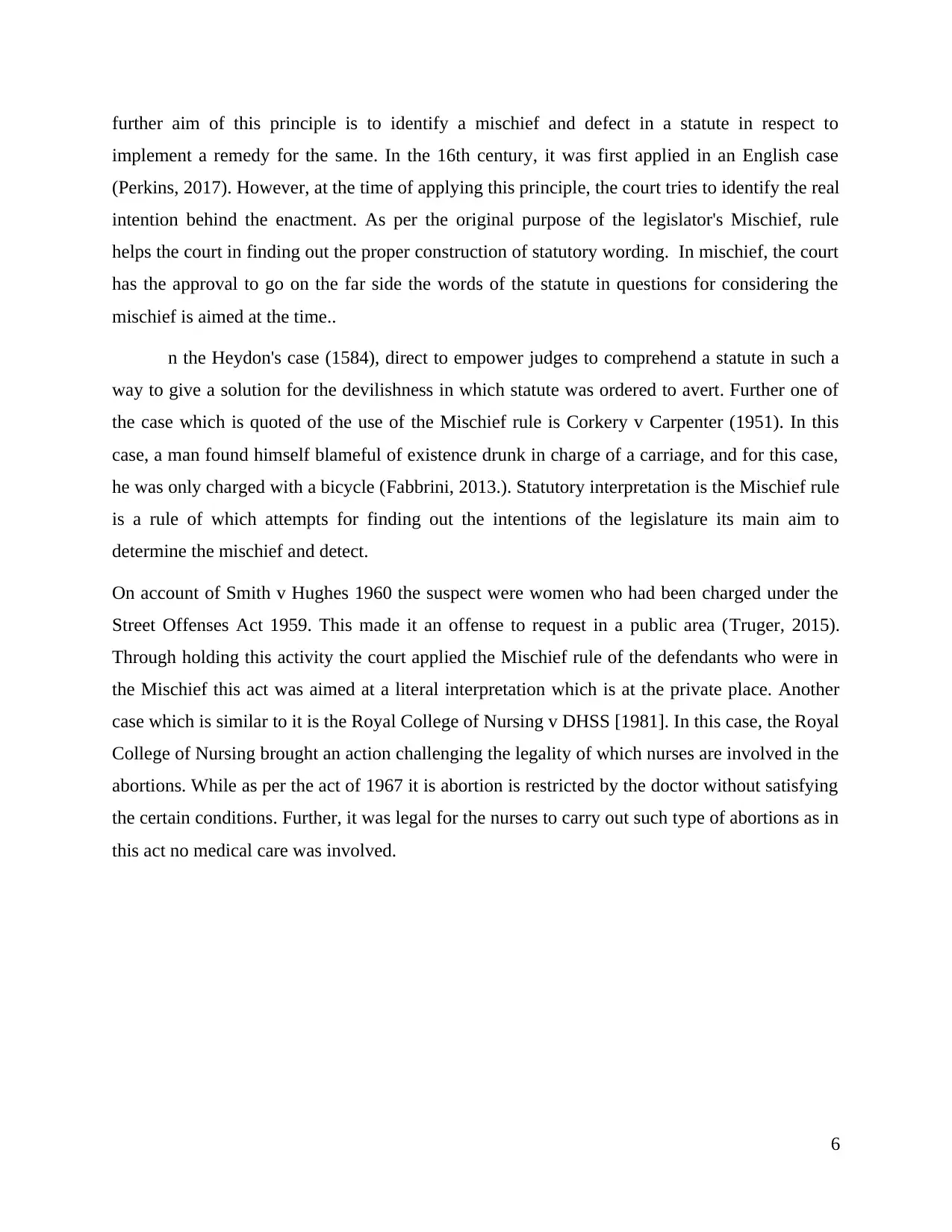
further aim of this principle is to identify a mischief and defect in a statute in respect to
implement a remedy for the same. In the 16th century, it was first applied in an English case
(Perkins, 2017). However, at the time of applying this principle, the court tries to identify the real
intention behind the enactment. As per the original purpose of the legislator's Mischief, rule
helps the court in finding out the proper construction of statutory wording. In mischief, the court
has the approval to go on the far side the words of the statute in questions for considering the
mischief is aimed at the time..
n the Heydon's case (1584), direct to empower judges to comprehend a statute in such a
way to give a solution for the devilishness in which statute was ordered to avert. Further one of
the case which is quoted of the use of the Mischief rule is Corkery v Carpenter (1951). In this
case, a man found himself blameful of existence drunk in charge of a carriage, and for this case,
he was only charged with a bicycle (Fabbrini, 2013.). Statutory interpretation is the Mischief rule
is a rule of which attempts for finding out the intentions of the legislature its main aim to
determine the mischief and detect.
On account of Smith v Hughes 1960 the suspect were women who had been charged under the
Street Offenses Act 1959. This made it an offense to request in a public area (Truger, 2015).
Through holding this activity the court applied the Mischief rule of the defendants who were in
the Mischief this act was aimed at a literal interpretation which is at the private place. Another
case which is similar to it is the Royal College of Nursing v DHSS [1981]. In this case, the Royal
College of Nursing brought an action challenging the legality of which nurses are involved in the
abortions. While as per the act of 1967 it is abortion is restricted by the doctor without satisfying
the certain conditions. Further, it was legal for the nurses to carry out such type of abortions as in
this act no medical care was involved.
6
implement a remedy for the same. In the 16th century, it was first applied in an English case
(Perkins, 2017). However, at the time of applying this principle, the court tries to identify the real
intention behind the enactment. As per the original purpose of the legislator's Mischief, rule
helps the court in finding out the proper construction of statutory wording. In mischief, the court
has the approval to go on the far side the words of the statute in questions for considering the
mischief is aimed at the time..
n the Heydon's case (1584), direct to empower judges to comprehend a statute in such a
way to give a solution for the devilishness in which statute was ordered to avert. Further one of
the case which is quoted of the use of the Mischief rule is Corkery v Carpenter (1951). In this
case, a man found himself blameful of existence drunk in charge of a carriage, and for this case,
he was only charged with a bicycle (Fabbrini, 2013.). Statutory interpretation is the Mischief rule
is a rule of which attempts for finding out the intentions of the legislature its main aim to
determine the mischief and detect.
On account of Smith v Hughes 1960 the suspect were women who had been charged under the
Street Offenses Act 1959. This made it an offense to request in a public area (Truger, 2015).
Through holding this activity the court applied the Mischief rule of the defendants who were in
the Mischief this act was aimed at a literal interpretation which is at the private place. Another
case which is similar to it is the Royal College of Nursing v DHSS [1981]. In this case, the Royal
College of Nursing brought an action challenging the legality of which nurses are involved in the
abortions. While as per the act of 1967 it is abortion is restricted by the doctor without satisfying
the certain conditions. Further, it was legal for the nurses to carry out such type of abortions as in
this act no medical care was involved.
6
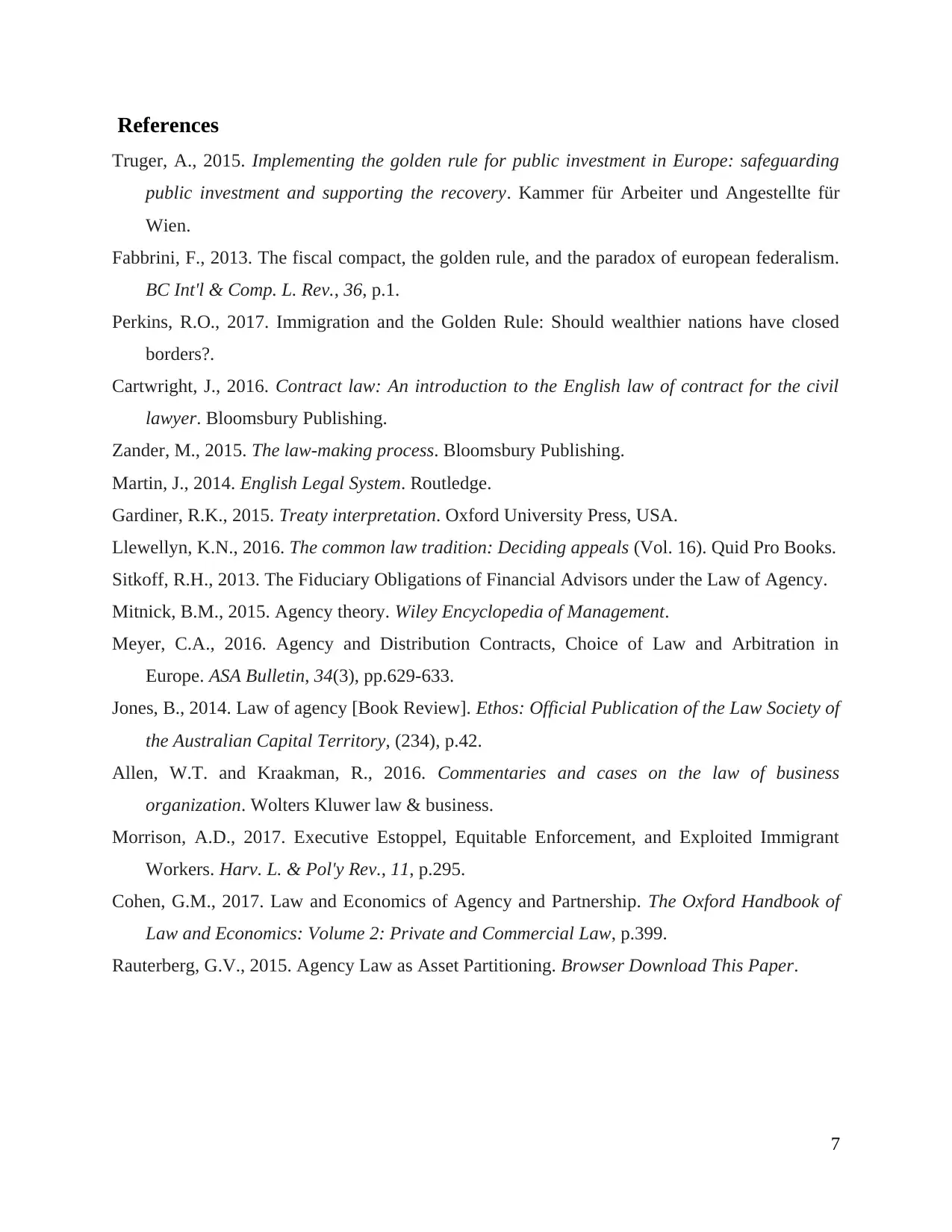
References
Truger, A., 2015. Implementing the golden rule for public investment in Europe: safeguarding
public investment and supporting the recovery. Kammer für Arbeiter und Angestellte für
Wien.
Fabbrini, F., 2013. The fiscal compact, the golden rule, and the paradox of european federalism.
BC Int'l & Comp. L. Rev., 36, p.1.
Perkins, R.O., 2017. Immigration and the Golden Rule: Should wealthier nations have closed
borders?.
Cartwright, J., 2016. Contract law: An introduction to the English law of contract for the civil
lawyer. Bloomsbury Publishing.
Zander, M., 2015. The law-making process. Bloomsbury Publishing.
Martin, J., 2014. English Legal System. Routledge.
Gardiner, R.K., 2015. Treaty interpretation. Oxford University Press, USA.
Llewellyn, K.N., 2016. The common law tradition: Deciding appeals (Vol. 16). Quid Pro Books.
Sitkoff, R.H., 2013. The Fiduciary Obligations of Financial Advisors under the Law of Agency.
Mitnick, B.M., 2015. Agency theory. Wiley Encyclopedia of Management.
Meyer, C.A., 2016. Agency and Distribution Contracts, Choice of Law and Arbitration in
Europe. ASA Bulletin, 34(3), pp.629-633.
Jones, B., 2014. Law of agency [Book Review]. Ethos: Official Publication of the Law Society of
the Australian Capital Territory, (234), p.42.
Allen, W.T. and Kraakman, R., 2016. Commentaries and cases on the law of business
organization. Wolters Kluwer law & business.
Morrison, A.D., 2017. Executive Estoppel, Equitable Enforcement, and Exploited Immigrant
Workers. Harv. L. & Pol'y Rev., 11, p.295.
Cohen, G.M., 2017. Law and Economics of Agency and Partnership. The Oxford Handbook of
Law and Economics: Volume 2: Private and Commercial Law, p.399.
Rauterberg, G.V., 2015. Agency Law as Asset Partitioning. Browser Download This Paper.
7
Truger, A., 2015. Implementing the golden rule for public investment in Europe: safeguarding
public investment and supporting the recovery. Kammer für Arbeiter und Angestellte für
Wien.
Fabbrini, F., 2013. The fiscal compact, the golden rule, and the paradox of european federalism.
BC Int'l & Comp. L. Rev., 36, p.1.
Perkins, R.O., 2017. Immigration and the Golden Rule: Should wealthier nations have closed
borders?.
Cartwright, J., 2016. Contract law: An introduction to the English law of contract for the civil
lawyer. Bloomsbury Publishing.
Zander, M., 2015. The law-making process. Bloomsbury Publishing.
Martin, J., 2014. English Legal System. Routledge.
Gardiner, R.K., 2015. Treaty interpretation. Oxford University Press, USA.
Llewellyn, K.N., 2016. The common law tradition: Deciding appeals (Vol. 16). Quid Pro Books.
Sitkoff, R.H., 2013. The Fiduciary Obligations of Financial Advisors under the Law of Agency.
Mitnick, B.M., 2015. Agency theory. Wiley Encyclopedia of Management.
Meyer, C.A., 2016. Agency and Distribution Contracts, Choice of Law and Arbitration in
Europe. ASA Bulletin, 34(3), pp.629-633.
Jones, B., 2014. Law of agency [Book Review]. Ethos: Official Publication of the Law Society of
the Australian Capital Territory, (234), p.42.
Allen, W.T. and Kraakman, R., 2016. Commentaries and cases on the law of business
organization. Wolters Kluwer law & business.
Morrison, A.D., 2017. Executive Estoppel, Equitable Enforcement, and Exploited Immigrant
Workers. Harv. L. & Pol'y Rev., 11, p.295.
Cohen, G.M., 2017. Law and Economics of Agency and Partnership. The Oxford Handbook of
Law and Economics: Volume 2: Private and Commercial Law, p.399.
Rauterberg, G.V., 2015. Agency Law as Asset Partitioning. Browser Download This Paper.
7
⊘ This is a preview!⊘
Do you want full access?
Subscribe today to unlock all pages.

Trusted by 1+ million students worldwide
1 out of 9
Related Documents
Your All-in-One AI-Powered Toolkit for Academic Success.
+13062052269
info@desklib.com
Available 24*7 on WhatsApp / Email
![[object Object]](/_next/static/media/star-bottom.7253800d.svg)
Unlock your academic potential
Copyright © 2020–2026 A2Z Services. All Rights Reserved. Developed and managed by ZUCOL.





